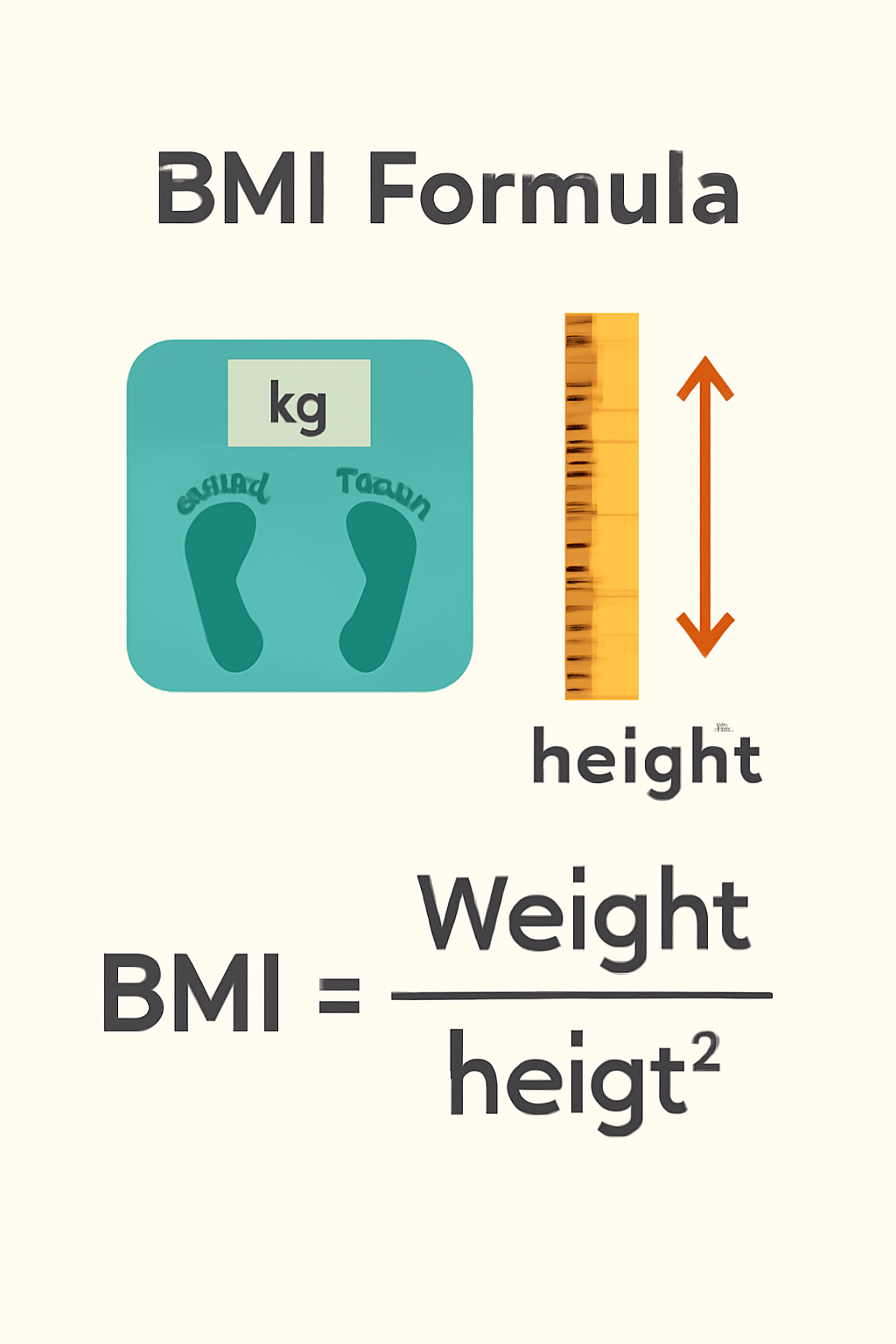How to Calculate BMI at Home: A Complete Step-by-Step Guide
Health & Fitness / Nutrition / By NutriFitCalc Team
Introduction
Knowing your health status is important, and one of the easiest ways to track it is by calculating your Body Mass Index (BMI). Many people wonder how to calculate BMI at home, but the process is simple and does not require special medical equipment. With just your weight and height, you can measure BMI at home and understand whether your body weight falls within a healthy range.
In this guide, we will explain what BMI is, why it matters, and how to measure BMI at home for both male and female adults. We will also cover how to calculate lean body mass at home, how to accurately measure BMI at home, and the best tools to use. By the end, you will be confident in checking your BMI anytime without professional help.

Calculate your BMI easily at home with simple measurements
What is BMI?
Body Mass Index (BMI) is a simple calculation that uses your height and weight to determine whether you are underweight, normal weight, overweight, or obese. It is widely used as a screening tool for weight-related health risks.
| BMI Value | Category |
|---|---|
| Below 18.5 | Underweight |
| 18.5 – 24.9 | Normal weight |
| 25 – 29.9 | Overweight |
| 30 and above | Obese |
Source: World Health Organization
While BMI does not directly measure body fat, it provides a quick way to evaluate whether your weight is in a healthy range for your height.
Why Calculate BMI at Home?
You do not need to visit a clinic to know your BMI. Learning how to find BMI at home can help you track your health and fitness progress regularly.
Benefits include:
- Quick health check
- Tracking weight loss or gain
- Early warning sign for obesity-related risks
However, BMI has limitations. It does not differentiate between muscle and fat, so athletes with high muscle mass may appear overweight. Still, it remains a valuable starting point for health awareness (CDC on BMI).

Regular BMI tracking helps monitor your health progress
Tools You Need to Measure BMI at Home
Before you start, make sure you have the following:
- Weighing Scale: Digital scales provide better accuracy
- Measuring Tape or Height Scale: Measure your height in centimeters or meters
- Calculator or Online Tool: The formula is simple, but an online calculator saves time
You can use the free Nutrifitcalc BMI Calculator for instant results.
How to Calculate BMI at Home (Formula + Examples)
The formula for BMI is straightforward:
BMI = weight (kg) / height² (m²)
Example for a Female
- Weight: 60 kg
- Height: 1.65 m (165 cm)
- BMI = 60 / (1.65 × 1.65) = 22.0 (Normal weight)
Example for a Male
- Weight: 80 kg
- Height: 1.75 m (175 cm)
- BMI = 80 / (1.75 × 1.75) = 26.1 (Overweight)
You can also use pounds and inches with the adjusted formula:
BMI = (weight in pounds × 703) / height² (inches)
For reference, NHS BMI calculator also uses the same formula.
Step-by-Step Instructions for Different Cases
How to Measure BMI at Home (General)
- Measure your weight using a digital scale
- Measure your height without shoes
- Apply the formula or use an online calculator
How to Measure BMI at Home Female
For women, BMI is calculated the same way, but interpretation should consider body composition, as women naturally carry more body fat than men.
How to Measure BMI at Home Male
For men, muscle mass may make BMI appear higher, so BMI should be viewed alongside waist size and lifestyle factors.
How to Measure Body Mass Index at Home Accurately
- Always measure in the morning before eating
- Use consistent measuring methods
- Avoid heavy clothes when weighing
Using Online Tools to Find BMI at Home
Instead of doing manual calculations, online calculators provide instant results.
How to Use Nutrifitcalc BMI Calculator
- Enter your weight in kilograms
- Enter your height in centimeters
- Click Calculate BMI
- Instantly see your BMI score and category
Try it now at Nutrifitcalc.com.
This method is quick, free, and ensures accurate results without manual errors.
Calculate Your BMI NowHow to Calculate Lean Body Mass at Home
Lean Body Mass (LBM) measures the weight of everything in your body except fat (muscles, bones, organs, water). It helps understand fitness better than BMI alone.
For men: LBM = (0.407 × weight in kg) + (0.267 × height in cm) – 19.2
For women: LBM = (0.252 × weight in kg) + (0.473 × height in cm) – 48.3
Example Calculation
- Male, 80 kg, 175 cm → LBM = 59.5 kg
- Female, 60 kg, 165 cm → LBM = 43.2 kg
For more details, check Healthline's lean body mass guide.
How to Accurately Measure BMI at Home
Accuracy matters when calculating BMI. Here are some tips:
- Weigh yourself at the same time daily, preferably in the morning
- Stand straight when measuring height
- Remove heavy clothing and shoes
- Always use metric or imperial consistently
More accuracy tips can be found in Mayo Clinic's BMI overview.
Limitations of BMI and When to See a Doctor
While BMI is useful, it does not measure fat distribution or muscle mass. A bodybuilder may appear overweight, even with low fat percentage.
Alternative health checks include:
- Waist-to-hip ratio
- Body fat percentage tests
- Skinfold calipers
If your BMI is too high or too low, consult a doctor for further evaluation.

Understand the limitations of BMI for a complete health picture
Conclusion
Calculating BMI at home is simple, quick, and valuable for monitoring your health. Whether you prefer manual formulas or online tools, you can easily measure BMI at home for both male and female adults. For best results, use a reliable online calculator like Nutrifitcalc, which provides instant and accurate results.
BMI is not perfect, but it gives you a strong starting point to understand your health status. Combine it with other health checks and professional advice for a complete picture.
Try Our BMI CalculatorFAQs
You can use the manual formula with your weight and height, or quickly estimate using an online chart.
Yes, use the formula: BMI = (weight in pounds × 703) / height² (inches).
The formula is the same, but interpretation may differ due to natural body composition differences.
A BMI between 18.5 and 24.9 is considered normal.
Yes, but interpretation is different. Pediatric BMI charts should be used.
Disclaimer
The information provided in this blog post is for general informational purposes only. It is not intended as medical advice, diagnosis, or treatment. Please consult a healthcare professional before making any significant changes to your health or fitness routine. The accuracy of BMI calculations may vary based on individual factors.

I went over this web site and I believe you have a lot of great information, saved to my bookmarks (:.